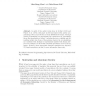Free Online Productivity Tools
i2Speak
i2Symbol
i2OCR
iTex2Img
iWeb2Print
iWeb2Shot
i2Type
iPdf2Split
iPdf2Merge
i2Bopomofo
i2Arabic
i2Style
i2Image
i2PDF
iLatex2Rtf
Sci2ools
139
click to vote
EPS
1997
Springer
1997
Springer
Modeling Speculators with Genetic Programming
In spirit of the earlier works done by Arthur (1992) and Palmer et al. (1993), this paper models speculators with genetic programming (GP) in a production economy (Muthian Economy). Through genetic programming, we approximate the consequences of “speculating about the speculations of others”, including the price volatility and the resulting welfare loss. Some of the patterns observed in our simulations are consistent with findings in experimental markets with human subjects. For example, we show that GP-based speculators can be noisy by nature. However, when appropriate financial regulations are imposed, GP-based speculators can also be more informative than noisy. Key Words: Genetic Programming, Speculators, No-Trade Theorem, Short Selling, Volatility. 1 Motivation and Literature Review While it has been suspected for quite a long time that speculators can be destructive for the stability of markets, this property has not been successfully revealed from many formal models of spe...
Related Content
| Added | 07 Aug 2010 |
| Updated | 07 Aug 2010 |
| Type | Conference |
| Year | 1997 |
| Where | EPS |
| Authors | Shu-Heng Chen, Chia-Hsuan Yeh |
Comments (0)

